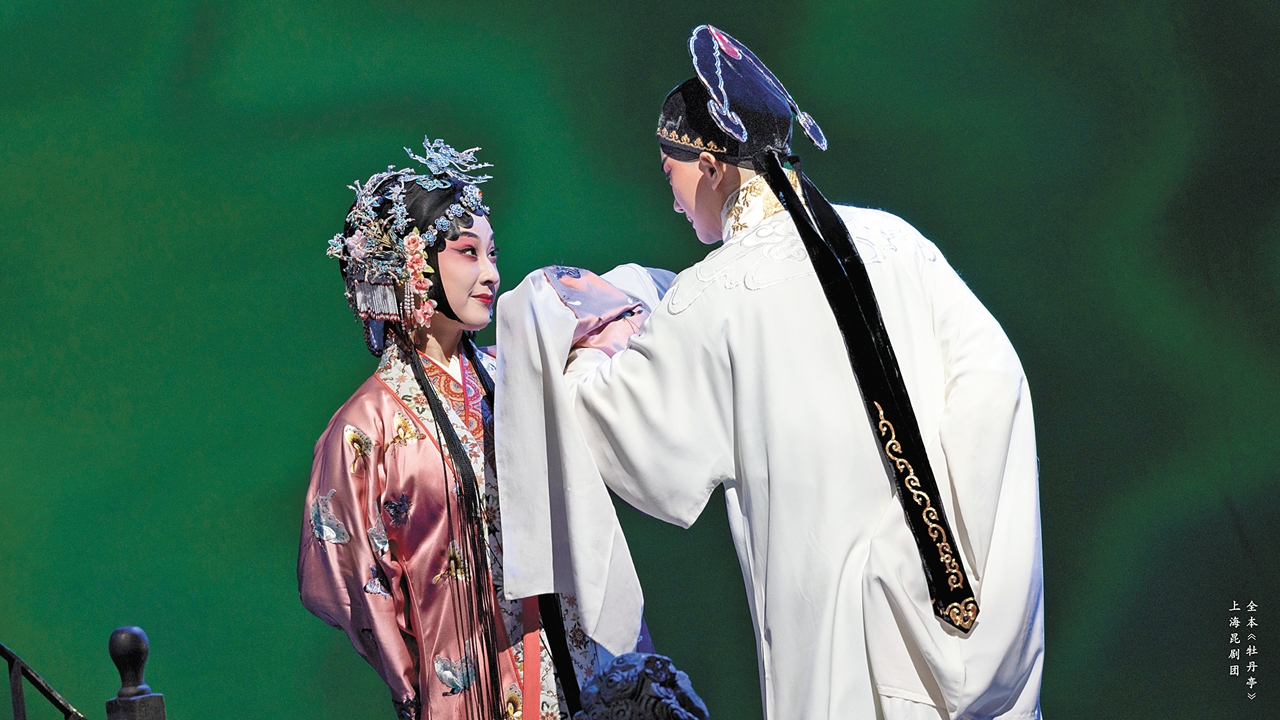Complete version of 'Peony Pavilion' to debut in SZ
Writer: Li Dan | Editor: Zhang Chanwen | From: Shenzhen Daily | Updated: 2024-03-14
“Love elicits dreams, and dreams elicit drama,” sums up the concept behind “The Peony Pavilion,” written by Ming Dynasty (1368-1644) playwright Tang Xianzu. The play paints a perfect picture of romantic love and individuals’ pursuit of liberty in an unlikely era. Written more than 400 years ago, its themes are still relevant today.
With Kunqu opera being named part of China’s intangible cultural heritage by the UNESCO in 2001, “The Peony Pavilion” has become the most-performed Kunqu opera piece and the pinnacle of this art form. However, staging its complete version has been a dream for generations of Kunqu artists. “This is our mission, and not doing it would cause us deep regret,” said Zhang Jingxian, a nationally acclaimed actress from the Shanghai Kunqu Opera Troupe (SKOT) and adviser to the current production.

A scene from SKOT’s complete-version “Peony Pavilion.” Photos Courtesy of Shenzhen Poly Theater
After premiering the complete work in Shanghai in November 2022, and touring to four northern Chinese cities last year, SKOT is finally bringing the masterpiece to Shenzhen Poly Theater for the first time in early April, staged in three shows over eight hours.
Comprising 55 scenes, a broad spectrum of themes, and an intricate mix of singing and acting, “The Peony Pavilion” is a huge undertaking to stage in its entirety. As such, various opera troupes have performed adaptations focusing on the love story between Liu Mengmei and Du Liniang. These condensed versions often begin with the scenes “Studying at Home” and “A Walk in the Garden,” where Du’s awakening starts, and end with “Returning to Life,” which demonstrates that “the living may die, and the dead may come back to life.”
Through the love story, the playwright depicts the beauty of life; yet romantic love is far from the only theme. Luo Chenxue, the actress who plays Du, said, “Love is beautiful, but on reading the original work repeatedly, one realizes romantic love is merely a part of life. ... I greatly admire Du’s pursuit of liberty. Not many women, even these days, have the same courage. We all have dreams, but how we face reality is a common challenge for people of any era.”

A scene from SKOT’s complete-version “Peony Pavilion.”
Over the years, multiple generations of artists from SKOT have taken on different versions of the play. After countless online rehearsals during the pandemic and over 40 days of rehearsals at a boot camp in the city of Tongxiang, “The Peony Pavilion” (Complete Version), finally met the audience in 2022. Director Guo Xiaonan further revised the script that had been trimmed and edited by the late playwright Wang Renjie.
It showcases the epic scale of the original text while revealing what life was like in the Ming Dynasty. It shines a spotlight on the context that nourishes the romance between Du and Liu — a society marked by continuous warfare and dominated by Neo-Confucianism that advocated cosmic principles and dismissed personal desires. Against this background, the purity of the love between Du and Liu stands out as precious and powerful.
The stage design utilizes four scene settings on a revolving stage, making entrances and exits more like modern drama. Right from the beginning, the director asked the two young artists, Luo and Hu Weilu (in the role of Liu Mengmei), to innovate during rehearsals without seeking advice from their mentors.
In the first installment of the play, the pair share a dreamlike, romantic love; in the middle, they spend time together, see Du return to life and experience a rapid change of fate during the war; while the final part, in which the couple have to deal with social etiquette, presents a challenge not only to the characters in the mortal world, but also to the way the two artists sustain their roles. With the third part rarely performed prior to SKOT’s endeavor, the two leading actors have no previous work to borrow from.
As mentor Zhang puts it, “They have to confront society with their decisions and gain approval for their relationship, so there will be tension in their voices, expressions and postures. The inner strength and control demanded by this performance is huge.”